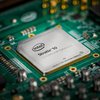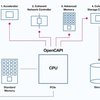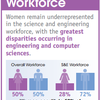The prospect of FPGA-powered supercomputing has never looked brighter. The availability of more performant chips, the maturation of the OpenCL toolchain, the acquisition of Altera by Intel, and the worlds largest deployment of FPGAs in the datacenter by Microsoft, suggest that reconfigurable computing may finally fulfill its promise as a major technology for high performance computing.
In what seems paradoxical, a group of computer scientists have demonstrated that reducing the mathematical precision in a supercomputing computation can actually lead to more accurate solutions. The premise of the technique is to apply the energy savings reaped from lower precision calculations toward additional computation that will improve the quality of the results.
AI startup Graphcore has emerged from stealth mode with the announcement of $30 million in initial Series A funding. The Bristol, UK-based company will use the cash infusion to complete development of its Intelligent Processing Unit (IPU), a custom-built chip aimed at machine learning workloads. The funding was led by Robert Bosch Venture Capital GmbH and Samsung Catalyst Fund; also joining were Amadeus Capital Partners, C4 Ventures, Draper Esprit plc, Foundation Capital and Pitango Venture Capital.
The prospect of non-volatile DIMMs as an additional memory tier in the server is getting a lot more attention these days. The advent of novel memory technologies like 3D XPoint, resistive RAM/memristors, and NAND-based memory modules, in conjunction with market forces that are demanding much higher memory capacities, lower power usage, and in some cases, memory persistence, are conspiring to drive a new generation of NVDIMM products to market.
IT giant Fujitsu has been developing a series of in-house technologies aimed at the burgeoning market of artificial intelligence and machine learning. Although the company has made less fanfare of its ambitions in this regard than companies like IBM, Google and Microsoft, the Japanese multinational seems intent on expanding its datacenter business into this new high-value segment.
The commercialization of artificial intelligence over the last several years is now getting the attention of governments, which are starting to think about the policy implications presented by these new technologies. A recent report published by the White House attempts to address the challenges presented by AI, but skirts one very important issue.
IBM has unveiled OpenCAPI, an open-standard, high-speed bus interface for connecting devices in servers. The announcement coincides with the formation of a consortium of the same name that will manage the new standard, and which initially includes tech heavyweights Hewlett Packard Enterprise (HPE), Dell EMC, NVIDIA, Mellanox, Micron, Xilinx, and Google. The first OpenCAPI-supported devices and servers are expected to show up in 2017.
Intel announced it is sampling its Stratix 10 FPGAs, the latest family of field programmable gate arrays that are designed to accelerate a number of datacenter workloads. The new devices, which Intel is calling the most significant FPGA innovations in over a decade, offer advanced features like embedded 64-bit ARM processors, second-generation High Bandwidth Memory (HBM2), and DSP blocks.
As HPC vendors like IBM and HPE have added deep learning-optimized systems to their product portfolio, Cray has been more circumspect about its plans in this area. We talked with Cray CTO Steve Scott about how they view this new application area of high performance computing and what they may have in the pipeline to serve this burgeoning market.
In a year in which a woman has a good chance of becoming the leader of the free world, talk of gender diversity has become pervasive. Even in the secluded confines of the HPC community, discussions of the underrepresentation of women in supercomputing has become a real topic, and at no time has this become more apparent than in the run-up to SC16.










